Bangladesh Khilafat Andolan is an Islamist political party in Bangladesh, founded by Hafezzi Huzur after the 1981 Bangladeshi presidential election. Hafezzi Huzur had been a presidential candidate in 1981. He came third, scoring 387,215 votes (1.79%). His candidacy was supported by the Islamic Republican Party and Bangladesh Justice Party.

Muḥammadullāh ibn Idrīs ibn Akram ad-Dīn al-Miyānjī, commonly known as Hafezzī Huzūr, was a Bangladeshi politician, Islamic leader and founder of the Bangladesh Khilafat Andolan. He was the first religious figure to stand for the highest state office in Bangladesh.
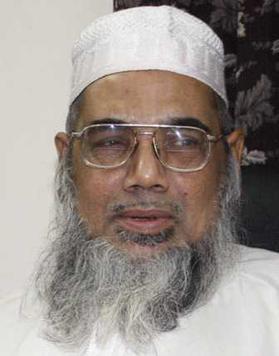
Faḍl al-Ḥaqq ibn Wājid ad-Dīn al-Amīnī, or simply Fazlul Hoque Amini was an Islamic scholar and politician from Bangladesh. He served as an MP in the Parliament of Bangladesh from 2002 to 2007. He was an expert in the fields of Islamic jurisprudence (fiqh), hadith and tasawwuf. He also held a number of positions on the boards of qaumi madrasahs. He was also the principal of Jamia Qurania Arabia Lalbagh in Lalbagh, Dhaka, one of the largest Deobandi Islamic schools of Bangladesh.
The Khelafat Majlish, also spelt Khelafat Majlis, is a far-right Islamist political party in Bangladesh. The party was founded in Dhaka, the capital of Bangladesh, in 1989 by Deobandi scholar Azizul Haque along with Ahmad Abdul Qadir and former leaders of the National Awami Party and Tamaddun Majlish. Since its founding, it has only ever gained one seat in the country's National Parliament. The party split into two in 2005, with Azizul Haque's faction taking the name Bangladesh Khelafat Majlish.

ʿAzīz al-Ḥaqq ibn Irshād ʿAlī ad-Dākawī, simply known as Azizul Haque or by his epithet Shaykh al-Hadith was a Bangladeshi Islamic scholar, politician, writer, and translator. He is the founder of Khelafat Majlish and first Bangali translator of Sahih al-Bukhari. He was vice chancellor of Jamia Rahmania Arabia Dhaka.

Shams al-Ḥaqq ibn Muḥammad ʿAbd Allāh ibn Chirāgh ʿAlī al-Farīdfūrī, or simply known as Shamsul Haque Faridpuri was an Islamic scholar, educationist, and social reformer. He was the founder-principal of Jamia Qurania Arabia Lalbagh. He also founded many other madrasas. Organisations which he initiated include; Khademul Islam Jamat and Anjuman-e-Tabligh-al-Quran.

Islami Andolan Bangladesh, abbreviated as IAB, is a major Islamist political party in Bangladesh. It was founded in 1987 by Fazlul Karim as Islami Shashontantra Andolan, and took its current name in 2008.

Muḥammad Junaid, popularly known as Junaid Babunagari, was a Bangladeshi Deobandi Islamic scholar, educator, writer, researcher, Islamic speaker and spiritual figure. He was the Amir of Hefazat-e-Islam Bangladesh, Shaykhul Hadith of Darul Uloom Hathazari Madrasa, vice-president of Befaqul Madarisil Arabia Bangladesh, Chairman of Chittagong Noorani Talimul Quran Board and Editor-in-Chief of Monthly Mueenul Islam.
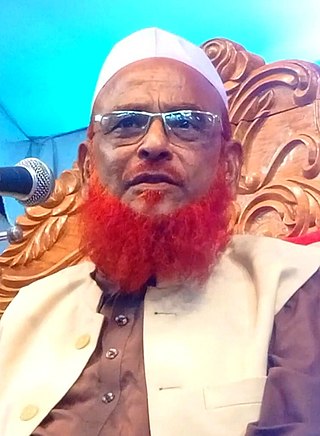
Nurul Islam Olipuri is an Islamic scholar of Bangladesh. Olipuri is best known for his interpretation of the Qur'an.
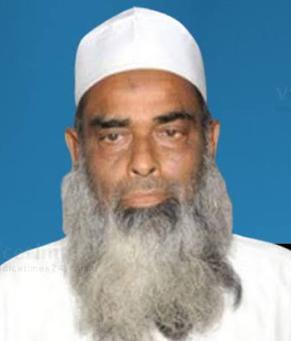
Muḥammad Waqqāṣ ibn Muḥammad Ismāʿīl al-Jasarī, or simply known as Muhammad Wakkas, was a Bangladeshi Islamic scholar, teacher, former Member of Parliament and State Minister. He was the founder of Jamia Imdadia Madaninagar Madrasa, the largest madrasa in South Bengal, accommodating roughly 2000 students.

Athar Ali was a Bangladeshi Islamic activist, author, teacher and politician. He participated in the Indian independence movement, and was former president of the Nizam-e-Islam Party. Ali was also a khalifah of Ashraf Ali Thanvi, one of the founders of the Deobandi movement.
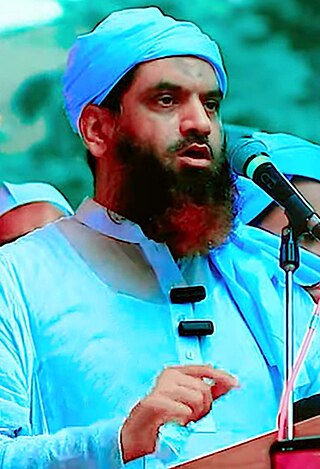
Mamunul Haque is a Bangladeshi Islamic scholar and the Joint Secretary-General of Hefazat-e-Islam Bangladesh, emerged as an Islamist leader in the late 2010s, particularly following the deadliest events of the Siege of Dhaka. With an ancestral heritage of religious scholarship and political leadership from his father, Azizul Haque, he succeeded his father both as a Sheikh al-Hadith at Jamia Rahmania and as the Secretary-General of Bangladesh Khilafat Majlis. He is best known for his oratory skills and his advocacy for the establishment of an Islamic state and the integration of Islamic principles into government policies. In 2020 and 2021, he led opposition to the construction of a sculpture of Sheikh Mujibur Rahman and organized anti-Modi protests, which made him the undisputed Hefazat leader overnight. He faced legal challenges, including 41 cases, one of which was a treason charge, and has been imprisoned three times under the Sheikh Hasina regime. Following the fall of this regime, he participated in discussions with the President and the Chief of Army Staff, which eventually led to the formation of the Yunus interim government, which included a member from Hefazat, A F M Khalid Hossain. In addition to his political and religious activities, he has served as an adjunct professor at Asian University of Bangladesh and is the editor of Rahmani Paigam, a monthly magazine published in Dhaka.
Maḥfūẓ al-Ḥaqq ibn ʿAzīz al-Ḥaqq ibn Irshād ʿAlī ad-Dākawī, or simply Mahfuzul Haque, is a Bangladeshi Deobandi Islamic scholar, politician, educator and public speaker. He is the former vice-president of Hefazat-e-Islam Bangladesh, secretary general of Befaqul Madarisil Arabia Bangladesh, chancellor of Jamia Rahmania Arabia, Dhaka and president of regional Qawmi education board Ittefaqul Madarisil Qawmia Muhammadpur. He is also a member of the standing committee of Al Haiatul Ulya and was the secretary-general of Bangladesh Khelafat Majlish.
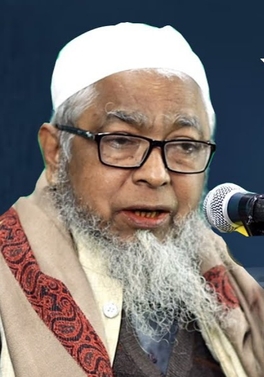
Shah Abdul Halim Bukhari was a Bangladeshi Deobandi Islamic scholar, educator, religious writer and spiritual figure. He is the former Advisor of Hefazat-e-Islam Bangladesh, Chancellor of Al Jamia Al Islamia Patiya, Secretary General of Anjuman-e-Ittihadul Madaris Bangladesh, Chairman of the Shariah Supervisory Committee of Shahjalal Islami Bank Limited, President of Organization of Islamic Conference Bangladesh and Organization of Tahfizul Quran Bangladesh, Editor-in-chief of Monthly At-Tawhid. In 2018, he was nominated as a member of the Standing Committee of Al-Haiatul Ulya Lil-Jamiatil Qawmia Bangladesh.

Syed Muhammad Rezaul Karim, also known by his title Charmonai Pir, is a Bangladeshi Deobandi Islamic scholar, politician, religious speaker and social reformer who serving as the second leader of Islami Andolan Bangladesh. He is also President of the Bangladesh Mujahid Committee and Bangladesh Quran Education Board, and the Vice President of Befaqul Madarisil Arabia Bangladesh.
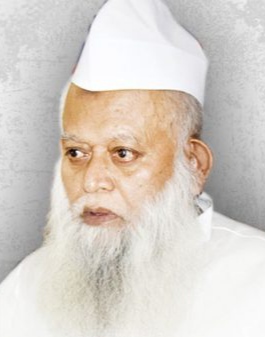
Nur Hossain Kasemi was a Bangladeshi Deobandi Islamic scholar, politician, educator, religious speaker and spiritual figure. He was the secretary general of Hefazat-e-Islam Bangladesh and Jamiat Ulema-e-Islam Bangladesh, vice-president of Al-Haiatul Ulya Lil-Jamiatil Qawmia Bangladesh, senior vice-president of Befaqul Madarisil Arabia Bangladesh and Shaykhul Hadith and rector of Jamia Madania Baridhara, Dhaka and Jamia Sobhania Mahmud Nagar. He had played a leading role in the Hefazat movement, Khatam an-Nabiyyin movement etc. He was well-known among the Muslim masses as an Islamic leader. He was also involved in running nearly 45 Islamic seminaries.

Abul Fayez Muhammad Khalid Hossain is a Bangladeshi Islamic scholar and currently serves as the Adviser for Religious Affairs in the Yunus interim government since 8 August 2024. His appointment marks the first time an Islamic scholar has held this advisory role in Bangladesh. He is also the Vice President of Hefazat-e-Islam Bangladesh and serves as the Education Adviser for Islami Andolan Bangladesh. He previously held the position of President of Islami Chhatra Samaj, the student wing of the Nizam-e-Islam Party. In academia, he is a visiting professor at the International Islamic University Chittagong and has previously served as an adjunct professor at the Asian University of Bangladesh. He was also the head of the Department of Islamic History and Culture at Omargani M.E.S. College. His editorial roles include serving as the editor of the monthly journal At-Tawheed and assistant editor of Balagh al-Sharq. He serves as a columnist for four national newspapers and has authored over two hundred research articles in a range of journals, including The Muslim World League Journal. He has published 20 books and was a key figure in editing volumes 3 to 9 of the second edition of the Islami Bishwakosh and the Sirat Encyclopedia, both published by the Islamic Foundation Bangladesh.
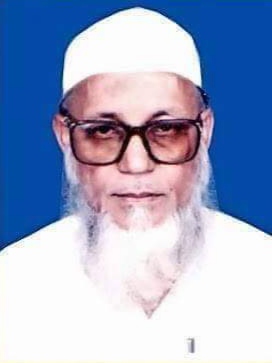
Shamsuddin Qasemi was a Bangladeshi Islamic scholar, politician, author and educationist. He was the founding president of the Khatme Nabuwwat Andolan Council, former secretary-general of Jamiat Ulema-e-Islam Bangladesh, former principal of Jamia Madania Chittagong and Jamia Hussainia Arzabad, and the founding chief-editor of the monthly Paygam-e-Haqq and weekly Jamiat magazines. He is also noted for his contributions during the Bangladesh Liberation War of 1971.
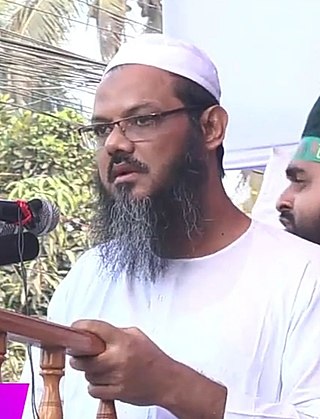
Syed Faizul Karim is a Bangladeshi Islamic scholar and politician. He is known as Shaikh-e-Charmonai to his supporters. He is serving as Senior Vice President of Islami Andolan Bangladesh. He is also the Vice President of Bangladesh Mujahid Committee and Bangladesh Quran Education Board and Central Member of Befaqul Madarisil Arabia Bangladesh. During his student life, he served as the central president of the Islami Chhatra Andolan Bangladesh.
White Paper: 2000 Days of Fundamentalist and Communal Violence in Bangladesh is a white paper published in February 2022 by the People's Commission to Investigate radical and communal Terrorism in Bangladesh. To investigate the communal attacks and religious frenzy that took place in Bangladesh in February–March 2021, this public commission was formed by the joint initiative of the Ekattorer Ghatak Dalal Nirmul Committee and the Tribal and Minority Affairs Caucus of the Jatiya Sangsad. In this white paper, 116 speakers associated with Islamist organizations and institutions are termed as 'religion traders' by raising various charges including financing of militants, spreading hatred, money laundering, communal terrorism, irregularities, corruption, extorting money in the name of Waz, and 1,000 madrassas under Hefazat-e-Islam Bangladesh were accused of radicalization. The 2,200-page investigation report has also mentioned the names of various religious groups including Hefazat and administrative officials including DC, OC who helped them and encouraged communal violence. The recommendation of the Swetpatra emphasized on filing a case against them. After the Swetpatra was submitted to the Anti-Corruption Commission and the National Human Rights Commission on May 12, 2022, there was extensive discussion about it. Home Minister Asaduzzaman Khan said that the People's Commission has no basis. The day the Swetpatra was submitted, Islamic parties and organizations protested against it.

















